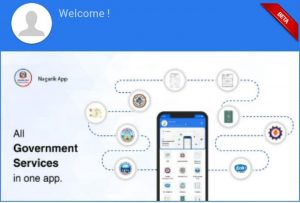
The National ID card is now available on the Nagarik App, a significant step towards digitising public services in Nepal. Following successful integration between the Nagarik App and the National Identity Card system, citizens can now access their ID details via the app, according to Ramesh Sharma Paudel, Director of the Department of Information Technology (DoIT).
“We’ve made the National ID accessible through the app starting Tuesday afternoon. Citizens whose IDs have been issued can now view their details on the platform,” Paudel told Onlinekhabar.
How it works
Users can access their National ID by selecting the “National ID” option in the app and entering their National Identity Number (NIN). This feature became operational following the Cabinet’s decision on October 18, 2024 allowing interlinking of various government systems.
Director Yubaraj Kattel of the National ID and Registration Department explained that after rigorous testing, the service is now live. He noted that the integration aims to make ID-based services accessible to all citizens.

Increasing adoption
Over 55 million users have already downloaded the Nagarik App, with 49.1 million downloads on Android, 6.1 million on iOS, and over 2,300 accesses via the website. Currently, the app provides 62 services from 35 government entities.
The National Identity Management Information System has registered details of over 16.5 million citizens, and more than 6 million ID cards have been printed. As of now, 16.1 million citizens have received their National Identity Numbers (NIN).
“Citizens who have received their NIN can now apply for passports and access other government services using the app. They no longer need a physical ID card to utilize these services,” said spokesperson Shivaraj Shedhain.
Services enabled by the NIN
With the NIN, citizens can:
- Apply for passports
- Open bank accounts
- Obtain telecom SIM cards
- Access various government-provided digital services
Government officials will verify details through QR codes and the NIN, ensuring secure and streamlined service delivery.
Overcoming challenges
While 2 million citizens have already received physical ID cards, 5.5 million cards have been distributed to districts across Nepal. However, citizens in remote areas like Mugu, Dolpa, and Humla face difficulties in acquiring their NINs due to logistical hurdles.
Many complain that cumbersome processes in government offices discourage citizens from using available services. Officials believe that expanding the use of the Nagarik App can reduce reliance on intermediaries and eliminate the need for in-person visits to government offices.
Enhanced features of the Nagarik App

The app offers several innovative features:
- Banking and Passport Services: Citizens can open bank accounts and apply for passports within minutes using QR codes or their NIN.
- Secure Data Integration: The app ensures data security and privacy, pulling relevant details only with user consent.
- Government Office Integration: Citizens can send their information directly to government offices through scanning features, reducing the need for paperwork.
- Traffic Fine Payment: Traffic violations can be resolved digitally by scanning QR codes on e-challans and paying fines via mobile banking or digital wallets.
- Additional Services: Services like obtaining police clearance certificates, registering complaints with Hello Sarkar, and acquiring permanent account numbers (PAN) are also available.
Towards a digital future
Experts believe the app can revolutionise public service delivery, provided there is strong political and administrative commitment. “Integrating photos, biometric data, and other records between government departments could eliminate the need for repetitive paperwork,” said IT expert Manohar Bhattarai.
However, Bhattarai emphasised the need for institutional capacity-building and skilled manpower to implement these changes effectively. He called for a unified national strategy to digitize services, which could significantly reduce citizens’ reliance on physical queues.
Upcoming features
The government plans to expand the app’s capabilities further. Soon, citizens will be able to request passes for entry to Singha Durbar (Nepal’s administrative hub) directly through the app. Notifications regarding approvals will appear on the app, enabling seamless access using QR code scanning at entry points.
Other planned features include:
- Linking services from the Citizen Investment Fund, Employee Provident Fund, and Social Security Fund
- Streamlined processes for accessing educational certificates, labor permits for foreign employment, and no-objection letters for overseas study
- Integration with local government websites to provide detailed service information
Addressing user concerns
The app currently links citizens’ documents, such as citizenship certificates, passports, driving licenses, voter IDs, health insurance cards, and academic records. This centralized system aims to minimize the hassle of carrying physical documents.
“By integrating all government-issued identification cards into the app, we are creating a single platform for accessing government services,” said Paudel.
Challenges in implementation
Despite these advancements, challenges persist. Limited budget allocations have slowed progress in maintaining and updating the app. For instance, the app received just Rs 5 million annually, hindering its development.
IT professionals argue that Nepal could adopt cutting-edge technology from around the world to enhance online services. However, they criticise the lack of political will and administrative efficiency to drive such changes.
Government’s commitment
Prime Minister KP Sharma Oli, during a recent discussion with IT experts, emphasised the need to digitise essential services. He expressed the government’s commitment to enabling citizens to register companies, obtain VAT numbers, and complete other tasks online from the comfort of their homes.
The Nagarik App, launched on January 15, 2021, under Oli’s leadership, is seen as a crucial tool for modernizing public administration. Although subsequent governments neglected the app’s maintenance, Oli’s return to power has renewed efforts to make it more efficient and user-friendly.
The integration of the National ID into the Nagarik App marks a significant step towards digital governance in Nepal. While challenges remain, the government’s vision of a streamlined, paperless administration offers hope for a more efficient and citizen-friendly system.
As Nepal continues its journey towards digitisation, the Nagarik App could become a cornerstone of public service delivery, ensuring convenience, transparency, and accessibility for all citizens.




















